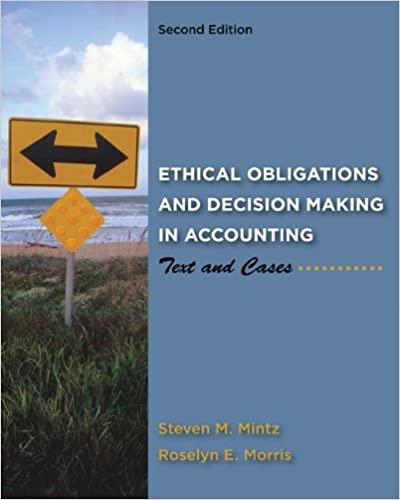Jason Tybell has been employed as a junior accountant by the professional accountancy corporation of Rodgers &
Question:
Jason Tybell has been employed as a junior accountant by the professional accountancy corporation of Rodgers & Philips for two years. Jason graduated with a bachelor’s degree in accounting from State University. He became a CPA after passing all parts of the computerized CPA exam in one sitting.
Jason is on the fast track with Rodgers & Philips, and he receives high evaluations from his seniors. He hopes to make partner in eight years. However, something just happened during an audit in his second year that makes him question whether that will ever happen—at least at Rodgers & Philips.
Jason is concerned about a meeting he will have later in the day with his mentor, William Jackson. The meeting concerns the fact that Jason was not asked to work on the current year’s audit of two clients that he did work on during his first year. It is unusual for a second-year staff accountant not to continue unless something went wrong the first year. Jason is not aware of any such occurrence, but he is preparing for the worst. At a recent meeting of the partners of Rodgers & Philips, Jackson was informed that a third client has complained about Jason. As a result, Jason will be told by his mentor that he will not serve on the audit engagement of this client as well. Jackson discovered that Jason was given a good evaluation on the audit by the senior. However, the manager in charge of the audit requested that Jason not serve on the engagement team again because of complaints about Jason’s inappropriate comments in meetings with client personnel.
For example, Jason made a sarcastic comment to the office manager about the lack of organization of the computer files and records. Jason said, “Who set up this system, a five-yearold?”
The comment was relayed to the indignant controller who informed the manager of the audit.
Jason enters William Jackson’s office at 4:00 p.m. “Come in Jason.” “Thanks, Bill. I gotta tell you I’m nervous about this meeting.”
Jackson hesitated. He didn’t expect Jason to be so blunt.
Jackson decided to do the same.
“Jason, you have managed to upset some of our biggest clients.”
“How so?” Jason responded.
“For starters, Cindi Laramie said that you made an inappropriate comment to her office manager last week and the controller was furious when he found out.”
“Oh, you mean the comment about a five-year-old?”
Jason asked.
“That’s exactly what I mean,” answered Jackson. “If you're aware that it was inappropriate, why did you make it?”
Jason said nothing.
“More important,” Jackson said, “why didn’t you apologize to the office manager and controller?”
Silence ensued for over a minute while Jason poured a glass of water and collected his thoughts. His mentor started to become impatient. Jackson walked over to Jason, put his hand on Jason’s shoulder and asked, “Is everything okay at home?”
“Of course,” Jason responded.
“Well, can you explain to me why you made the comment?”
Jackson asked.
“I was just kidding. I thought the office manger had a good sense of humor.”
At this point Jackson began to realize there was a big problem with Jason. Client contact is an important part of the responsibilities of all staff members in public accounting.
Jackson now senses that Jason might not have what it takes. He decides to end the meeting by making an excuse that he had to go somewhere. Jackson did this to stall so that he could schedule an appointment with other key people in the firm to discuss the future of Jason Tybell.
Questions
1. Accountants are often judged on skills other than technical skills. What are those skills? Why are they important in public accounting?
2. Do you think it’s ever appropriate for a staff accountant to joke around with a member of the client’s organization?
Why or why not? Identify ethical values to support your answer.
3. Is it right for a CPA firm or any other employer to give good evaluations to an employee and then turn around and fire that employee for something that was not noted in the evaluation? What’s wrong with doing this from an ethical perspective? Use ethical reasoning to answer this question.
4. If you were making the decision in this case with respect to Jason’s future in the firm, what would you do and why?
Step by Step Answer:

Ethical Obligations And Decision Making In Accounting Text And Cases
ISBN: 9780078025280
2nd Edition
Authors: Steven Mintz, Roselyn Morris





